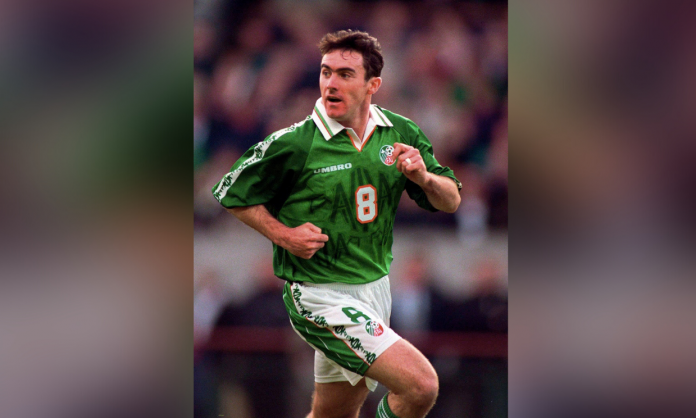By Sean Ryan
It is one of the moments in life where you ask yourself where you were? In this case where were you the night Alan McLoughlin scored that memorable goal against Northern Ireland on a cold night on November 17th 1993 night at Windsor Park, Belfast to earn the Republic of Ireland soccer team a famous point which qualified Jack Charlton’s men for the 1994 World Cup Finals in the US.
McLoughlin became forever famous for that 76th minute goal which cancelled out Jimmy Quinn’s spectacular opener for the North in Billy Bingham’s last game as Northern Ireland manager. It was therefore with great sadness in early May that football fans all over the world were saddened to hear of Alan McLoughlin’s passing at the age of 54.
Born near Manchester City’s old Maine Road ground with a Galway born father and a Limerick born mother, McLoughlin earned 42 caps for the Republic of Ireland between 1990 and 1999, scoring two goals. He was called up to the Ireland B squad in early 1990, scoring in a 4-1 win over England in a ‘B’ international in Turner’s Cross in March of that year.
McLoughlin made his first team debut for Ireland in a pre-World Cup friendly against Malta in June 1990. He was included in the Republic of Ireland squad for both Italia 90 and USA 94. He won the Republic of Ireland Player of the Year award in 1996 and earned his final cap in a fateful 1-1 draw against Macedonia in November 1999.
At club level, McLoughlin’s most notable spells were at Swindon Town (1986-90) and Portsmouth (1992-99). With the latter, he scored 68 goals in 361 appearances and was instrumental in their run to the FA Cup semi-final in 1992. In later years, he served as first team coach at Portsmouth in 2013 and 2014 and latterly worked as academy manager at Swindon Town and as a BBC Radio pundit.
However McLoughlin had suffered ill health in recent years. In 2012, he had been diagnosed with a kidney tumour and underwent a successful operation. However, in November 2019, he received news that his cancer had spread to his remaining kidney, chest wall and lung. In March 2021, he revealed that he was living with renal cell carcinoma and was to undergo radiotherapy treatment.
In a statement, Portsmouth FC said they were “devastated” to learn of his death and paid tribute to their former star, saying “the former Blues player, radio pundit, academy coach and first team coach had been fighting a brave battle against cancer. “He played a key role in the side that came so close to reaching the FA Cup final as a second tier club in 1992 and then almost reached the Premier League the following year.”
President Michael D Higgins has been among those leading the tributes to McLoughlin. In a statement, he said: “Supporters of Irish soccer, and in particular those who will have followed the team during the Charlton and McCarthy eras, will have been greatly saddened by the news of the death of former Republic of Ireland international Alan McLoughlin. “His passing at such an early age comes after a long battle with cancer. “Sabina and I send our deepest sympathies to his family and friends, and to all those who knew him as a player for both club and country.”
In a statement tonight, FAI President Gerry McAnaney paid tribute to McLoughlin: “Alan will always be remembered for that goal in Belfast 28 years ago, a goal that brought the entire country to its feet. He was a great player for Ireland, a fantastic footballing man who coached so many young players and a very proud family man. We were lucky to have him as one of our Irish football family and I know I speak on behalf of everyone involved with Irish football when I sympathise with Deby and his family at this most difficult of times.”
FAI CEO Jonathan Hill added: “This is most tragic news and our thoughts now are with Alan’s wife Deby, his two daughters and his extended family. “I spoke with Alan before we honoured him at the Luxembourg game in March and I know how proud he was of his 42 appearances in the Ireland jersey. He went to two World Cups with Ireland and will always be remembered for that night in November in 1993. May he rest in peace.”








